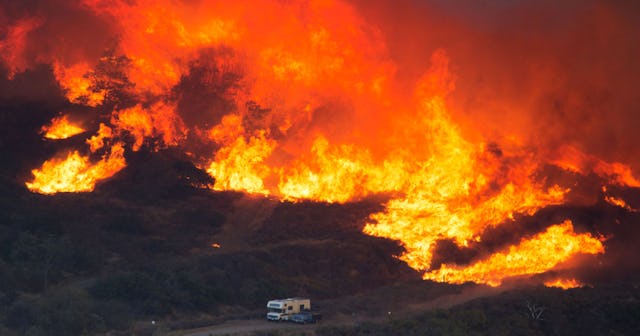We're Now Experiencing One Climate Change Disaster Each Week

The effects of climate change aren’t way down the road — they are here now, and it’s bad
The United Nations (UN) is warning that we need to act on climate change immediately — not only to prevent irreparable damage in the future, but because the consequences of climate change are hurting us right now. In fact, the UN says that even though not all of them make international news headlines, climate change disasters are taking place worldwide at the rate of one a week.
“This is not about the future, this is about today,” Mami Mizutori, the UN secretary-general’s special representative on disaster risk reduction, told The Guardian.
While some climate crisis disasters get worldwide coverage, like the droughts in India and the heatwaves in Europe, and while we’re aware of some of the national effects in the United States, such as last summer’s wildfires and this spring’s storms in the midwest, many are unaware that “lower impact” disasters are taking place across Earth, all related to global warming. These smaller-scale disasters may not make the nightly news here in the U.S., but they can still greatly affect millions of people and cause widespread damage, especially in developing countries.
For example, Cyclone Kenneth struck Mozambique in April, the largest tropical storm to hit the region in recorded history, and one of a series of record-breaking tropical storms in the area this year. The storm caused over $100 million in damage and killed dozens, though you might not have heard or read about it this spring.
The UN says that the cost of these disasters is currently about $520 billion each year — that’s $10 billion a week. And as the climate crisis continues, that number will only go up.
“This is not a lot of money [in the context of infrastructure spending],” Mizutori said, “but investors have not been doing enough. Resilience needs to become a commodity that people will pay for.”
Mizutori’s main point is that we need to spend more on preventative infrastructure and preparing to live in a world with more disasters, not just spend on cutting back on the emissions that are causing the crisis. While we of course need to stop adding to the problem of climate change, we need to realize that climate change is here now, and we need to be ready.
“People need to talk more about adaptation and resilience,” she said.
Especially in developing countries, where people may not live in disaster-proof structures, or where there aren’t emergency systems in place, even lower-level climate disasters can be extremely destructive, with long-lasting consequences. Victims of severe weather, storms, droughts, and fires could be without water, food, medical care, shelter, and other necessities for extended periods of time. We need to focus on getting these systems in place, everywhere, for the coming years of the continued climate crisis.
“We talk about a climate emergency and a climate crisis, but if we cannot confront this [issue of adapting to the effects] we will not survive,” she told The Guardian. “We need to look at the risks of not investing in resilience.”
What does investing in resilience look like? It would involve global warming-safe buildings, more robust transportation and water supply networks, and overall city and rural systems that are better equipped to deal with disaster. In addition, better weather warning systems and better response systems could save lives and prevent damage.
A series of photos recently showed how much the climate has changed just in the past ten years. And we’re surrounded by reminders on the news that what’s happening around us isn’t normal. It’s time to act now, not just to stop or slow global warming, but to prepare for what’s already happening around us.